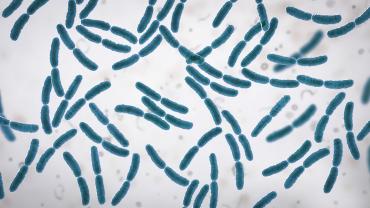
The gastrointestinal (GI) microbiome plays an important role in many facets of human health. Microbes in the GI tract have been shown to support immune health in a variety of ways. Some microbes produce short-chain fatty acids (SCFAs), which have been shown to influence immune homeostasis and intestinal barrier integrity. Other microbes may support human health by modulating the composition of the microbiome. Lactobacillus acidophilus DDS®-1 (DDS-1) is a probiotic shown in studies to support GI health and immune function.
An animal study by Vemuri and colleagues assessed the effect of supplementation with DDS-1 for 30 days on GI integrity and immune composition of both young and aging mice. In the groups treated with DDS-1, the study results showed changes in the size and amount of goblet cells and mucosal thickness.
Pro-inflammatory cytokines were also assessed in the study by Vemuri and colleagues. The DDS-1 groups experienced changes in interleukin (IL)-6, IL-1 beta, and other pro-inflammatory cytokines. Significant reductions in IL-1 alpha were observed in the young probiotic group as compared to a placebo. Changes in tumor necrosis factor-alpha, interferon-gamma, IL-5, and IL-10 were also observed.
Regarding human studies, a randomized double-blind, placebo-controlled clinical trial by Martoni and colleagues explored the effects of supplementation with DDS-1 on individuals with irritable bowel syndrome (IBS). Inflammation and an immune response are believed to play roles in the pathophysiology of IBS. Research related to IBS has shown the presence of mucosal inflammation at microscopic and molecular levels. Previous studies indicate that supplementation with probiotics may play a role in the relief of certain symptoms related to IBS.
The study by Martoni and colleagues randomized 330 adults, ranging in age from 18 to 70 who met the Rome IV diagnostic criteria for IBS. The treatment arms consisted of DDS-1 or Bifidobacterium animalis subsp. lactis UABla-12™ at a potency that was not less than 1 x 1010 CFU per capsule. Study participants took one dose daily before a meal for 6 weeks. The primary outcome was the change in abdominal pain severity based on the Abdominal Pain Severity - Numeric Rating Scale (APS-NRS).
On day 21 of the study, a greater reduction in the APS-NRS scores was observed in the DDS-1 arm as compared to the placebo. Significant changes in APS-NRS scores were observed at the end of the treatment period in both groups compared to the placebo. Significant reductions in IBS symptom scores and improvements in quality of life were also observed in the DDS-1 group. An increase in normal stool types was also observed, particularly in the DDS-1 group.
Lactobacillus acidophilus DDS®-1 is a probiotic that may support the body’s response to inflammation. It may also provide support for gastrointestinal health and immune function. Further studies may provide more information regarding the health-supportive role of DDS-1.
By Colleen Ambrose, ND, MAT